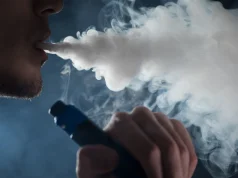
After a first round on Diacetyl and on the war that is engaged to bring discredit to what is considered by some researchers as the most advanced treatment to smoking, Dr Farsalinos comes back to the screen in order to highlight, with his expert eye, some of the controversial aspects of the e-cigarette.
The gateway effect is a legitimate concern and the attractiveness of flavors to the youth is an issue. However, the surveys indicate that despite a lot of experimentation by the youth, regular use of e-cigarette by teenagers and young adults is scarce. And in contrast, the increase of e-cigarette use by teenagers and young adults that has been recently noticed in the US is accompanied by what the researcher considers the biggest decline ever noticed in cigarette smoking for 40 years, for the first time below 10%, which is incompatible with a gateway effect.
If the issue is that kids are using e-cigarettes, the simple solution he supports is to ban the sales of the device to the kids, and it is what the State of Hawaii has done, restricting sales to adults over 21 years old on January 1st, 2016. And it is no reason to ban flavors.
The cardiologist reminds that the high demand for flavors comes from the users themselves. Most of the e-juice makers are, themselves, vapers who decided to share their juices with other vapers and to market their receipts. Detractors who pretend that the candy flavors were designed to attract the youth are not in phase with the market history, yet extremely contemporary.
Second-hand vaping or the risk for bystanders is not confirmed by scientific studies, he says. The levels of potentially harmful components, when diluted in the vaping space, are generally non-mesurable. And second-hand exposure to nicotine is so low that it has no biological effect to a non-vaper sharing the same space; the researcher compares the quantity absorbed by the non-vaper to his eating 300 g of eggplants.
In conclusion, the message is clear, preventing people from using e-cigarettes by discouraging them to use it or exaggerating harmfulness is like sentencing people to death. And we are confident that some health professionals are staying on course despite of a rough context.











